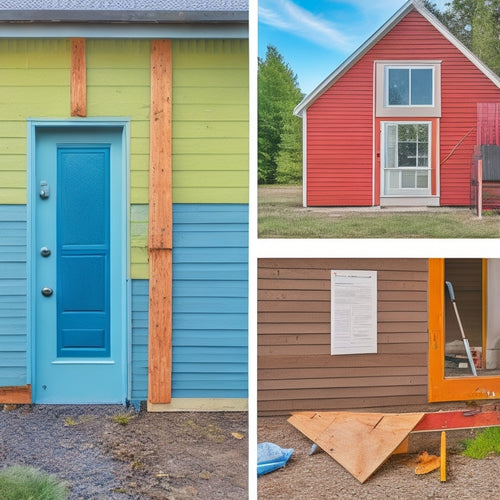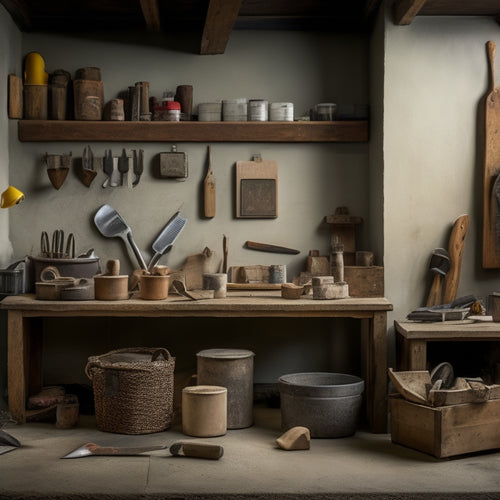
3 Essential Rentals for a Smooth Renovation
Share
When tackling a renovation, you'll need to rent essential tools to get the job done efficiently. For flooring, rent a flooring stapler, nailer, and tapping block to guarantee precise installation. For demolition, identify the flooring type and rent the necessary tools, such as a tile scraper or carpet remover, along with protective gear. Finally, rent equipment for subfloor preparation, like a floor scraper or grinder, to achieve a smooth surface. By renting these three essential tools, you'll set yourself up for a successful renovation - and understanding the specific requirements for each will help you tackle the project with confidence, taking you one step closer to a flawless finish.
Key Takeaways
• Rent specialized flooring tools, like flooring staplers and nailers, for precise and secure installation.
• Efficient demolition and removal require the right tools, such as tile scrapers and carpet removers, and protective gear.
• Rent equipment for subfloor preparation, including floor scrapers, grinders, and self-leveling screed, to ensure a smooth surface.
• Don't overlook tool maintenance, including regular cleaning and lubrication, to prevent rust and ensure optimal performance.
• Identify essential rentals based on the type of flooring and renovation project to avoid costly mistakes and delays.
Renting the Right Flooring Tools
When tackling a flooring renovation project, you'll need to rent the right tools to guarantee a professional-looking outcome. This starts with a thorough understanding of the equipment required for each stage of the process.
For flooring installation, you'll need a range of specialized tools, including a flooring stapler, flooring nailer, and a tapping block. These tools will ensure a precise and secure installation.
Additionally, you'll need to take into account tool maintenance to prevent damage and extend the lifespan of your rentals. Regularly clean and lubricate your tools to prevent rust and corrosion.
For a successful flooring installation, it's also essential to rent a floor scraper, edger, and sanding machine. These tools will help you prepare the subfloor, remove old flooring, and smooth out the surface for a flawless finish.
Efficient Demolition and Removal
To efficiently demolish and remove existing flooring, you must first identify the type of flooring you're working with, as this will determine the best approach and tools required for the job.
For instance, if you're dealing with ceramic tiles, you'll need a tile scraper or hammer and chisel to break them up, whereas carpeted floors require a carpet remover or knee kicker to loosen the adhesive.
Regardless of the flooring type, demolition safety is vital. Wear protective gear, including gloves, safety glasses, and a dust mask, to prevent injury from flying debris or airborne particles.
Next, consider debris disposal; rent a dumpster or debris container to keep the worksite organized and facilitate efficient waste removal.
Don't forget to separate recyclable materials, like concrete or asphalt, from non-recyclable waste.
Smoothing Out the Subfloor
With your demolition debris cleared, you're ready to tackle the subfloor, where unevenness or damage can compromise your new flooring installation. Take out your trusty floor scraper or grinder to identify and address any imperfections. As you inspect the subfloor, look for cracks, dips, and unevenness that need attention.
Renting a self-leveling screed or a concrete grinder can help you achieve a smooth, even surface.
Subfloor preparation is essential, and moisture control is a key aspect of it. Check for moisture issues by conducting a moisture test, and address any concerns with a moisture barrier or epoxy coating. This will guarantee a solid bond between the subfloor and your new flooring.
Renting a subfloor preparation tool, such as a rotary hammer or a concrete planer, can help you remove old adhesives, patch cracks, and create a smooth surface.
With the right equipment, you'll be able to achieve a flawless subfloor that's ready for your new flooring installation. By prioritizing subfloor preparation and moisture control, you'll guarantee a successful renovation that will last for years to come.
Frequently Asked Questions
Can I Renovate During Winter or Is It Better to Wait?
You can renovate during winter, but you'll need to take into account insulation carefully to prevent moisture buildup and guarantee proper drying; just be prepared for potential delays and higher heating costs.
How Do I Protect My Furniture During the Renovation Process?
"Renovation chaos, meet your match! You'll wisely shield your prized furniture with sturdy covers and protective barriers, ensuring a dust-free, scratch-less haven amidst the chaos, so you can breathe easy and focus on the transformation."
Are There Any Specific Licenses Required for Renovation Work?
'You'll need to make sure your contractor holds valid licenses and obtains necessary renovation permits before starting the project, as requirements vary by state and locality, and failing to comply can result in fines or project delays.'
Can I Live in the House During the Renovation Process?
While you're considering living in the house during renovation, be aware that it can amplify renovation challenges, and you may need to explore temporary accommodations to guarantee a comfortable and safe living environment.
What Is the Average Timeframe for a Full-House Renovation?
'As you commence on this transformative journey, envision a roadmap unfolding before you. The average timeframe for a full-house renovation spans 3-6 months, depending on the complexity of your project, with effective project management being key to a smooth renovation timeline.'
Conclusion
As you near the end of your renovation, remember that the right tools make all the difference.
Research supports the 'toolkit theory,' which suggests that access to the right equipment can greatly impact project efficiency.
By renting a flooring scraper, demolition dumpster, and subfloor planer, you'll avoid costly delays and guarantee a smooth renovation.
With these essentials, you'll be well on your way to a successful project that meets your timeline and budget.
Related Posts
-

Create a Home Renovation Project Timeline in Excel
You can create a detailed home renovation project timeline in Excel by setting up a tailored template with separate w...
-

Why Exterior Wall Renovation Requires a Plan
You're about to commence a complex and potentially costly project when you decide to renovate your exterior walls, an...
-

3 Beginner-Friendly Tools for Plaster Renovation Success
You'll be glad to know that the three essential tools you need for a successful plaster renovation are the same ones ...


